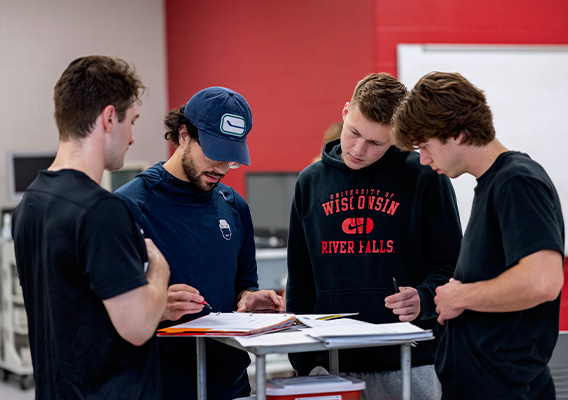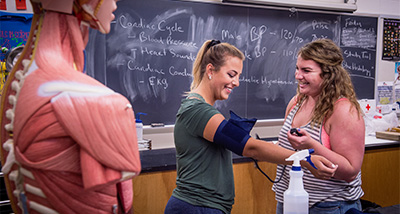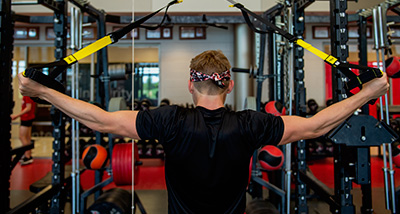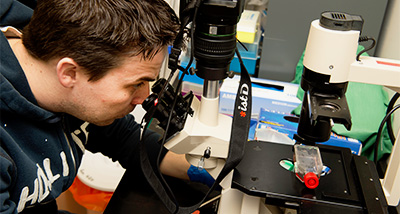
Why Study Clinical Exercise Physiology?
Graduate | Exercise Science/Science/Health/Health and Human Performance | CEBAH
UWRF offers a Master of Science degree in Clinical Exercise Physiology designed to prepare individuals for a variety of health maintenance and rehabilitative positions in the treatment of chronic diseases and disabling conditions. Graduates are well-suited for advanced career opportunities in the university, corporate, commercial, hospital and community settings.
Who is this program designed for?
- Individuals seeking employment in cardiac rehabilitation, preventive and disease management programs
- Baccalaureate graduates who want to continue their education and obtain a graduate degree
- Professionals currently working in the field of exercise and sports science who want to obtain a professional certification as a clinical exercise physiologist or a master’s degree
Program Details
- Students can begin their program in spring, summer or fall and complete their degree within 16 months.
- Classes are held via a blended model using online lectures plus an on-campus lab held one weekend each semester.
- All students will complete an internship in a cardiac rehabilitation setting at a regional hospital or rehabilitation center.
- The program has a graduation rate of 93% with 93% of graduates employed in the field.
Degree Requirements
Total credits to degree: 34
EXSS 700 Cardiac Anatomy and Physiology, 4 cr.
EXSS 701 Advanced Physiology of Exercise, 3 cr.
EXSS 710 Statistical Methods in Human Performance, 3 cr.
EXSS 715 Statistics and Research Methods in Health and Human Performance, 3 cr.
EXSS 720 Clinical Patient Behavior Change, 3 cr.
EXSS 740 Advanced Exercise Testing and Prescription, 3 cr.
EXSS 745 Chronic Disease in Health and Human Performance, 3 cr.
EXSS 755 Electrocardiography , 3 cr.
EXSS 785 Cardiopulmonary Rehabilitation, 3 cr.
EXSS 799 Thesis, 3 cr. (optional).
EXSS 774 Clinical Internship, 3-6 cr.
Admission Requirements
- A baccalaureate degree from an accredited institution showing an overall undergraduate grade point average of at least 2.75 on a 4.00 scale or an average of at least 2.75 in the last half of all undergraduate work or an average of at least 2.75 for no less than 12 semester credits of graduate study at another accredited graduate school
- Completed UW System application received with $56 processing fee (see Application Process).
Prerequisites
For applicants with a bachelor's degree in exercise science or equivalent:
- A three-credit undergraduate or graduate statistics or tests and measurements course. (Students without this course may be admitted provisionally but would need to complete this prerequisite before enrolling in EXSS 710 - Statistical Methods in Health and Human Performance.)
- A three-credit undergraduate or graduate physiology of exercise course. (Students without this course may be admitted provisionally but would need to complete this prerequisite before enrolling in EXSS 701- Advanced Physiology of Exercise.)
For applicants without a bachelor's degree in exercise science or equivalent:
- Statistics or tests and measurements course (3 credits)
- Physiology of exercise (3 credits)
- Exercise testing and prescription (3 credits)
Application Process
Applicants will apply online and submit the following additional materials:
- Transcripts from your past colleges or universities sent directly from the degree-granting institution to the Graduate Admissions Office
- One letter of recommendation
- Statement of interest (a two- or three-page essay describing career goals, reasons for pursuing a graduate degree and how the student plans to use the degree)
- Professional resume or vita
All documents must be submitted to the Graduate Admissions Office via email or mail to 103 David Rodli Hall, 410 S. 3rd St., River Falls, WI 54022.
Clinical Exercise Physiology
ricky.lopez@uwrf.edu // 715-425-4138
Your Degree:
Graduate
Area of Study:
Exercise Science/Science/Health/Health and Human Performance
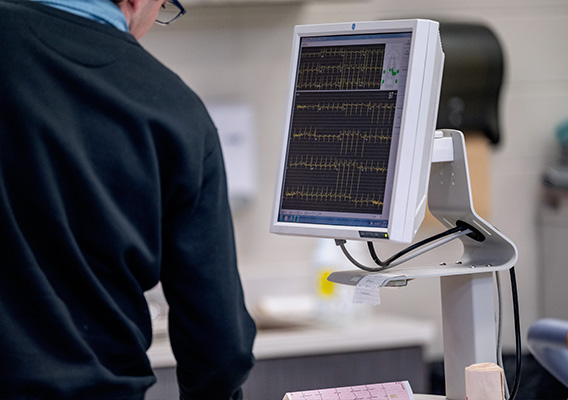
Skills and Learning Outcomes
- Assess a patient’s movement and physical activity in a laboratory setting.
- Understand and implement treatments for chronic diseases and disabling conditions.
- Critically interpret and integrate the latest scientific literature and research into practice.
Types of Courses
- Advanced Exercise Testing and Prescription
- Advanced Physiology of Exercise
- Cardiac Anatomy and Physiology
- Cardiopulmonary Rehabilitation
- Chronic Disease in Health and Human Performance
- Clinical Patient Behavior Change
- Electrocardiography
- Medical Pharmacology
